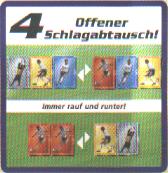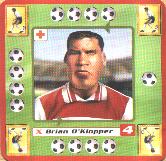![[Headline]](../technik/sonstige/headtran.gif)
![[Headline]](../technik/sonstige/headtran.gif)
![[IMAGE]](../bilder/finale.jpg) |
Author: Oliver Abendroth Publisher: Kosmos 1998 Awards: none |
![[IMAGE]](../technik/box/rot/rot-5.gif) ![[IMAGE]](../technik/box/gelb/gelb-6.gif) ![[IMAGE]](../technik/box/grun/grun-7.gif) ![[IMAGE]](../technik/box/pink/pink-4.gif) ![[IMAGE]](../technik/box/blau/blau-7.gif) |
|
Released at the Nürnberg-Games-Convention 1998, "Finale" is the 3rd game in Kosmosī "fabulous" two-player-games series.
Being a successor of "The Settlers Cardgame" and "Cäsar & Cleopatra", players are anxious to know in how far the high quality of the earlier games can be maintained. After spending time on the Isle of Catan and in the Roman Empire, the players now are drawn into a sports-arena.
In Finale, each player assumes the role of a coach of a soccer team which has succeeded to come to a decisive, title-winning match.
Four titles are available in Finale: The German Soccer-League title, the World Championship, the Champions-League and the UEFA-Cup.
But these titles only interest in tournament-play.
But the players may also have a match just for fun... At the beginning of the game, each player has to choose his team from a pool of 30 players for each team.
This player-pool contains offensive, defensive and mid-field players, and - of course - goalkeepers.
Each player has his individual strenght values, which may differ throughout the game if a player is involved into actions.
Each team receives 15 players from the player-pool (11 for the starting formation, 4 substitutes).
In order to make the game fair, the value of each team may not exceed "50". 
After choosing the team, the coaches have to chose 12 tactics card which will enable offensive-actions during the game. Normally, the coaches will chose cards depending on their team. So, if they have many defensive-players, they will take tactics cards requiring actions of defense-players. After the cards are chosen, each player mixes his tactics-cards and draws three of them, and then the referee will start the game... The game itself consists of 6 phases, with each phase having a duration of 15 minutes. At the beginning of a phase, each player may decide which tactics-card he will play for that phase. The coach who has played the highest card now will be attacking during this phase, whereas the other coachīs team will be defending. Depending on the card played by the attacker, the attacker now puts up some players (as shown on the tactics-card) to begin his tactic. After this, the defender also choses some players to defend against the attack. The strength-total for both attack and defense is calculated, and each player adds a random result from "0" to "3" to his strenght. If the attacker wins, he may enter the advanced phase and possibly score a goal, but if the defender wins, he will get a chance to make a counter-offensive (this means that the defending coach now may use his tactics-card and attacks.) After the calculation of the strength-totals, but before the game proceeds, the coaches have to adjust the strengths of the players used. Each player-card is turned 90 degrees clockwise, and now he will possibly have a new strength for his next action. Also, some players may receive a disqualification or an injury, and this may result in a coach losing strong, decisive players. Now only the changing-in of a reserve-player may possibly prevent his team from loosing... 
In the advanced phase, the coaches again chose players and calculate the strength-totals adding a dice-roll (in most cases, players used in the tactics phase may not be used again now). If the attacker wins again, he will score a goal. But if the defender wins or gets a tie, no goal will be scored. After this decision, again the player strengths are adjusted and possible injuries are decided. After the tactic card was revolved in the described way, the players look back onto the values of their tactic cards. The attacker always must make as many attacks in a phase as corresponding to the difference of the tactics-cards played. So if one coach has played a "2"-tactics-card and the other one has played a "5"-card, the coach with the "5" card will be the attacker and receive three attacks for the current game-phase. In the subsequent attacks during a turn, the attacker must play an additional tactics-card for each attack, and he me score a goal with each card. But a coach should keep prundent watch over the use of his tactics-cards, since each card is only useable once and each coach only has 12 tactics-cards for use. If all these are used up, he must refer to the so-called "finish" card for the rest of the game - and this means a heavy disadvantage since the "finish" card is very weak. There is also to remember, that once in each phase, the defender may make a counter-attack if the attacker fails to do one of his attacks. After a phase is completed, the game proceeds to the next phase, and again each coach plays a tactics-card in order to determine attacker and defender. Winner is the team with most goals after 6 phases. If there is a draw, the game may be prolonged 2 phases (to a total of 120 minutes). If there is still no winner, the winner will be found by a penalty-shooting. Once again, Kosmos has released a major danger for a playerīs free time. "Finale" offers a perfect mix of luck and strategy, and even beginners will have much fun with the game since there are recommended teams to start playing. The game virtually serves perfectly for almost any need: Players may just have a quick (about 40 minutes) fun game in a free afternoon hour, or they may decide to play an european cup match with two matches and a possible overtime. Most interesting is the possility of tournaments. I estimate that the game will result in many "Finale"-tournaments for the next game-conventions to come. Myself - being a soccer-fan - , I throughoutly enjoyed the game. There are so many elements which make the game som much like a real soccer match. So you can change players, decide on tactics and team, and fear for injuries or penalties. The team coaches have a certain amount of influence on their teams, but - just like in real soccer - luck may result in a totally unexpected turn of events. But let me quote the english soccer legend Gary Lineker: "Soccer is a game for 22 players and 3 referees. It has a duration of 90 minutes. And in the end, itīs always the germans who win the game." This time, the german game designers certainly have won the championsship. I think that "Finale" has set my players-heart on fire. Perhaps I will even scan images from my favourite team and thus build a personal "Finale"-team. See you at the stadium... | ||
|
| |

Looking for this game? Visit Funagain Games! |
|
|
| |
|
Kulkmann@aol.com
Copyright © 2006 Frank Schulte-Kulkmann, Essen, Germany | |